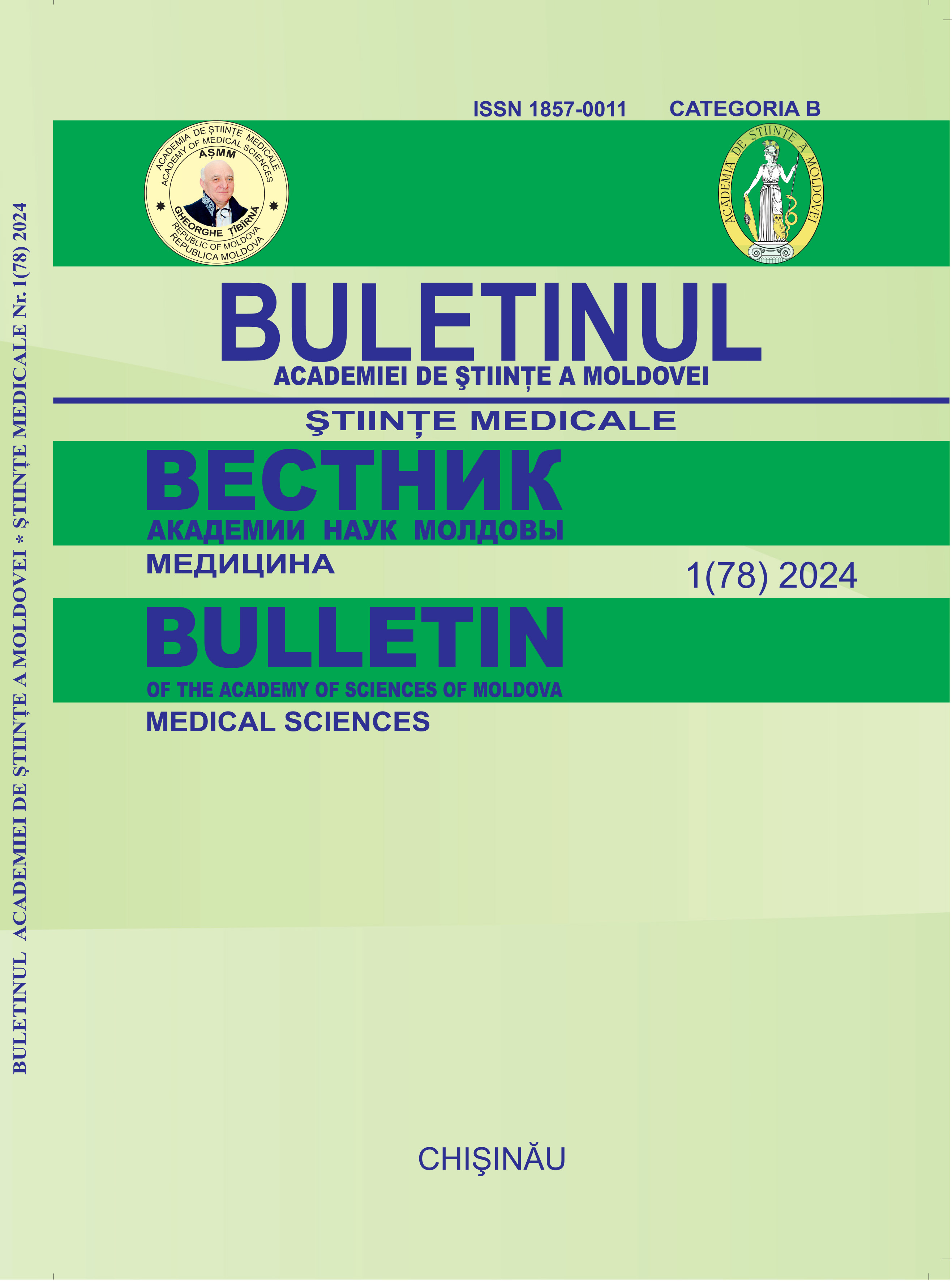Long-term prognosis in patients with pulmonary embolism
DOI:
https://doi.org/10.52692/1857-0011.2024.1-78.04Keywords:
pulmonary embolism, mortality, prognosisAbstract
Venous thromboembolism (VTE), clinically expressed as deep vein thrombosis (DVT) or pulmonary embolism (PE), is, globally, the third most common acute cardiovascular syndrome after myocardial infarction and stroke. Pulmonary embolism is associated with high morbidity and mortality. The long-term prognosis of these patients is insufficiently studied.Aim: To analyze mortality and clinical events at long-term follow-up in patients with confirmed PE. Material and methods: The study included 168 patients with PE, 53% men and 47% women, mean age 61.2±12.8 years, consecutively hospitalized in the Institute of Cardiology. Patients were classified into four risk groups according to the 2019 European Society of Cardiology Guidelines. Patients were followed-up for a mean period of 11.4±0.9 months. Results. During the study period died 23 people (13.7%), 8 of them during hospitalization and another 15 - after discharge from the hospital; in the latter, death occurred suddenly - in 4 cases (26.6%), it was due to cardiovascular causes- in 4 cases (26.6%), through cancer - in 5 (30%) people and from other causes - in 2 (13.3%) patients. Recurrent VTE was observed in 4 (2.5%) subjects, including PE - in 3 and DVT in 1 patient. During the surveillance period 4 (2.5%) patients developed stroke, 5 (3.1%) - acute myocardial infarction, 1 (0.2%) patient - another arterial event. Hemorrhagic complications suffered 20 patients. Chronic thromboembolic pulmonary hypertension was detected in 12.4% of people over 5.4±2.8 months after primary PE. Newly diagnosed cancer was observed in 2 (1.25%) people.Conclusions. The mortality rate in PE patients over an average period of 11.4±0.9 months was 13.7%, including 4.7% - in hospital and 8.9% - at long-term follow-up; in-hospital death was significantly higher in patients in the high and intermediate high risk category compared to those with intermediate-low and low risk and no statistically significant differences were established between these groups in the long-term mortality rate; the main cause of death in the hospital was PE, and during the surveillance period death from cardiovascular causes predominated, followed by death from cancer.
References
Konstantinides S., Meyer G., Becattini C., et al. 2019 ESC Guidelines for the diagnosis and management of acute pulmonary embolism developed in collaboration with the European Respiratory Society (ERS). The Task Force for the diagnosis and management of acute pulmonary embolism of the European Society of Cardiology. Eur Heart J 2020; 41: 543 - 603
Ng AC, Chung T, Yong AS, et al. Long-term cardiovascular and noncardiovascular mortality of 1023 patients with confirmed acute pulmonary embolism. Circ Cardiovasc Qual Outcomes. 2011;4:122–128.
Ebner M, Kresoja KP, Keller K, et al. Temporal trends in management and outcome of pulmonary embolism: a single-centre experience. Clin Res Cardiol. 2020;109:67–77.
Buller HR, Davidson BL, Decousus H et al.: Subcutaneous fondaparinux versus intravenous unfractionated heparin in the initial treatment of pulmonary embolism. N. Engl. J. Med. 2003; 349, 1695–1702
Wells PS, Anderson DR, Rodger MA et al.: A randomized trial comparing 2 low-molecular-weight heparins for the outpatient treatment of deep vein thrombosis and pulmonary embolism. Arch. Intern. Med. 2005; 165, 733–738.
The van Gogh Investigators. Idraparinux versus Standard Therapy for Venous Thromboembolic Disease. N Engl J Med 2007; 357:1094-1104
Musset D, Parent F, Meyer G et al. Diagnostic strategy for patients with suspected pulmonary embolism: a prospective multicentre outcome study. Lancet 2002; 360, 1914–1920 .
Nijkeuter M, Sohne M, Tick LW et al.: The natural course of hemodynamically stable pulmonary embolism: Clinical outcome and risk factors in a large prospective cohort study. Chest 2007;131, 517–523.
Perrier A, Roy PM, Aujesky D et al.: Diagnosing pulmonary embolism in outpatients with clinical assessment, D-dimer measurement, venous ultrasound, and helical computed tomography: a multicenter management study. Am. J. Med. 2004;116, 291–299.
Goldhaber SZ, Visani L, de Rosa M. Acute pulmonary embolism: clinical outcomes in the International Cooperative Pulmonary Embolism Registry (ICOPER). Lancet 1999; 353, 1386–1389
Murin S, Romano PS, White RH: Comparison of outcomes after hospitalization for deep venous thrombosis or pulmonary embolism. Thromb. Haemost. 2002; 88, 407–414
Lobo JL, Zorrilla V, Aizpuru F et al.: Clinical syndromes and clinical outcome in patients with pulmonary embolism: findings from the RIETE registry. Chest 2006;130, 1817–1822
Eckelt J., Hobohm L., Merten M., et al. Long-term mortality in patients with pulmonary embolism: results in a single-center registry Res Pract Thromb Haemost. 2023;7:e100280
Alotaibi G, Wu C, Senthilselvan A, McMurtry MS. Short- and longterm mortality after pulmonary embolism in patients with and without cancer. Vasc Med. 2018;23:261–266
Agnelli G, Prandoni P, Becattini C et al.: Extended oral anticoagulant therapy after a first episode of pulmonary embolism. Ann. Intern. Med. 2003;139, 19–25.
Pengo V, Lensing AW, Prins MH et al.: Incidence of chronic thromboembolic pulmonary hypertension after pulmonary embolism. N. Engl. J. Med. 2004; 350, 2257–2264
Miniati M, Monti S, Bottai M et al.: Survival and restoration of pulmonary perfusion in a long-term follow-up of patients after acute pulmonary embolism. Medicine 2006; 85, 253–262.
Heit JA, Silverstein MD, Mohr DN, et al. Predictors of survival after deep vein thrombosis and pulmonary embolism: a population-based, cohort study. Arch. Intern. Med. 1999; 159, 445–453
Faller N, Limacher A, Mean M, et al. Predictors and causes of long-term mortality in elderly patients with acute venous thromboembolism: a prospective cohort study. Am J Med. 2017;130:198–206.
Schulman S, RhedinAS, Lindmarker Pet al.: A comparison of six weeks with six months of oral anticoagulant therapy after a first episode of venous thromboembolism. N. Engl. J. Med. 1995; 332, 1661–1665
Buller HR, Cohen AT, Davidson B et al.: Extended prophylaxis of venous thromboembolism with idraparinux. N. Engl. J. Med. 2007; 357, 1105–1112
Downloads
Published
License
Copyright (c) 2024 Bulletin of the Academy of Sciences of Moldova. Medical Sciences

This work is licensed under a Creative Commons Attribution 4.0 International License.



